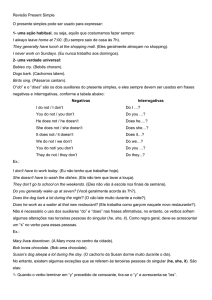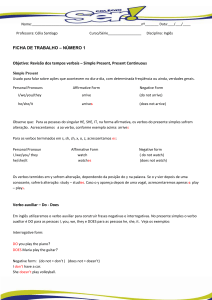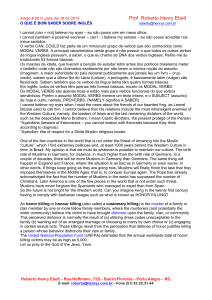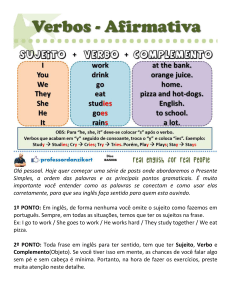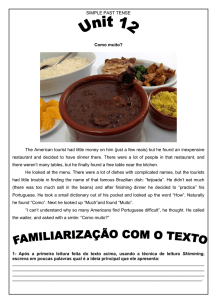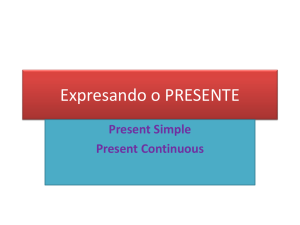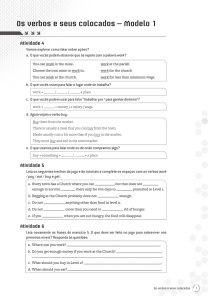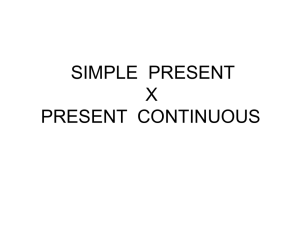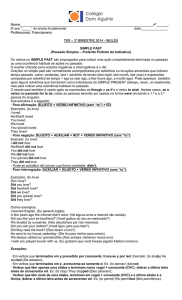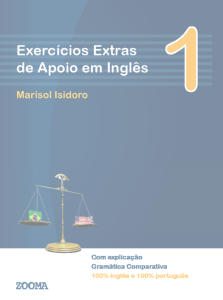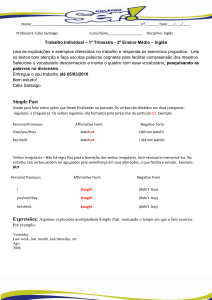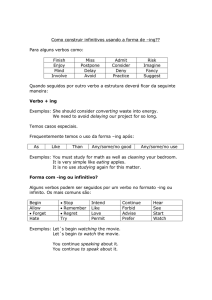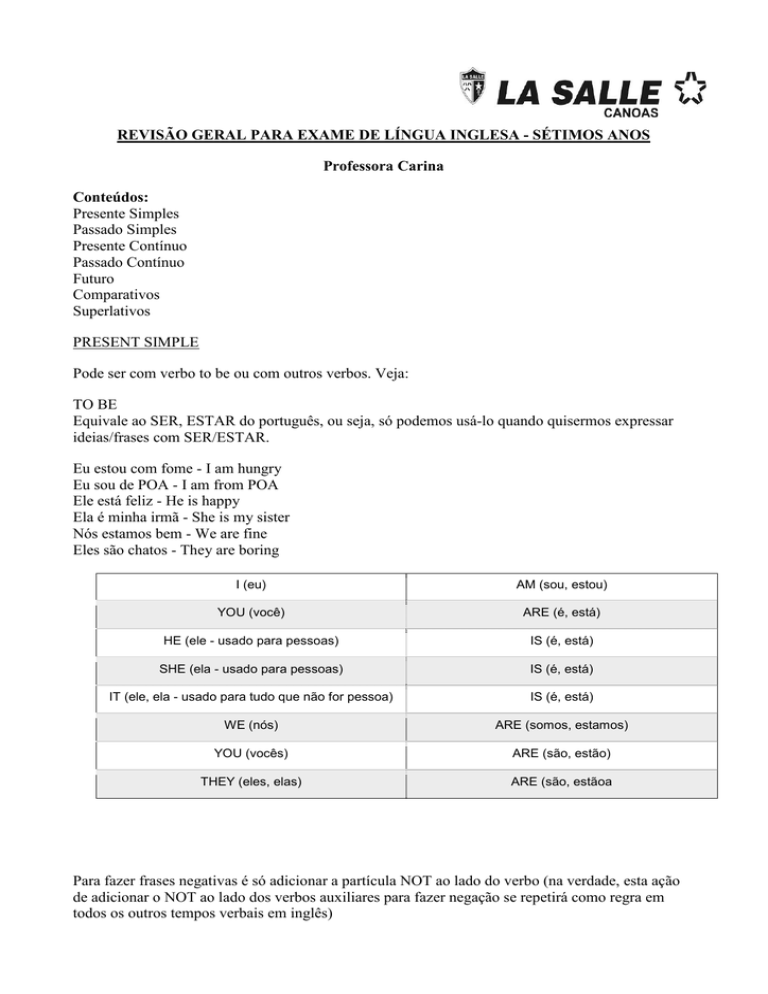
REVISÃO GERAL PARA EXAME DE LÍNGUA INGLESA - SÉTIMOS ANOS
Professora Carina
Conteúdos:
Presente Simples
Passado Simples
Presente Contínuo
Passado Contínuo
Futuro
Comparativos
Superlativos
PRESENT SIMPLE
Pode ser com verbo to be ou com outros verbos. Veja:
TO BE
Equivale ao SER, ESTAR do português, ou seja, só podemos usá-lo quando quisermos expressar
ideias/frases com SER/ESTAR.
Eu estou com fome - I am hungry
Eu sou de POA - I am from POA
Ele está feliz - He is happy
Ela é minha irmã - She is my sister
Nós estamos bem - We are fine
Eles são chatos - They are boring
I (eu)
AM (sou, estou)
YOU (você)
ARE (é, está)
HE (ele - usado para pessoas)
IS (é, está)
SHE (ela - usado para pessoas)
IS (é, está)
IT (ele, ela - usado para tudo que não for pessoa)
IS (é, está)
WE (nós)
ARE (somos, estamos)
YOU (vocês)
ARE (são, estão)
THEY (eles, elas)
ARE (são, estãoa
Para fazer frases negativas é só adicionar a partícula NOT ao lado do verbo (na verdade, esta ação
de adicionar o NOT ao lado dos verbos auxiliares para fazer negação se repetirá como regra em
todos os outros tempos verbais em inglês)
Ex.:
I am not hungry
He is not happy
We are not fine
Para fazer perguntas deslocamos o verbo TO BE e o trocamos de lugar com a PESSOA, SUJEITO
da frase (vamos ver também que esta ação de de deslocar os verbos auxiliares para fazer pergunta se
repetirá como regra em todos os outros tempos verbais em inglês)
Ex.:
Am I hungry?
Is he happy?
Are they boring?
OTHER VERBS
Bem, quando não queremos expressar ideias com SER/ESTAR não poderemos usar o verbo to be,
vamos usar outros verbos, principalmente os de ação, dando a ideia da rotina das nossas vidas, dos
nossos hábitos.
Eu leio todos os dias - I read every day
Eu vou para a aula de manhã - I go to school in the morning
Eles sempre jogam as noites - They always play games at night
Nós assistimos filmes nas sextas-feiras - We watch films on Fridays
****Para falar de rotina é preciso revisar os verbos de ação que mais fazem parte do seu dia-a-dia,
além de revisar advérbios de frequência (palavras e expressões como sempre, nunca, duas vezes por
semana, que expressam quantas vezes você faz cada atividade)
Para fazer negativas e Interrogativas no presente simples, sem verbo to be, vamos precisar dos
chamados verbos auxiliares. Os auxiliares aparecem em frases negativas e interrogativas, e eles
ajudam e indicam quando uma frase é uma negação ou pergunta e em qual tempo verbal esta frase
está. Quando os auxiliares aparecem os verbos principais voltam para a forma básica.
negativa:
I do not read every day
They do not play games at night
Você ainda pode contrair o auxiliar DO com a partícula de negação NOT - DON`T
We don`t watch films on Fridays
interrogativa:
Como falamos lá no verbo to be, ao fazer uma pergunta o verbo vai se deslocar com o sujeito. Então
quando o verbo to be não estiver presente nas frases, o que se desloca é o verbo auxiliar.
DO they play games at night?
HE, SHE, IT - na terceira pessoa do singular (equivalentes ou nosso ELE, ELA) temos uma
pequena conjugação que acontece nos verbos.
frases afirmativas - adiciono S, ES, OU IES no final dos verbos
he PLAYS sports every week (adicionar S ao final de todos os verbos é a regra geral)
she GOES to school by car (adicionar ES aos verbos terminados em O, S, CH, SH, X, Z)
she WATCHES tv
he STUDIES very much (adicionar IES ao final de verbos terminados em consoante + Y)
frases negativas e interrogativas - bem, nessas frases já falamos que o auxiliar deve aparecer,
falamos também que quando o auxiliar aparece o verbo principal fica na forma básica, sendo assim,
a conjugação é aplicada no verbo auxiliar. Veja:
DO vai virar DOES - da regra de adicionar ES ao final de verbos terminados em O…Então:
He DOES NOT study very much - He DOESN`T… (a contração também pode ser aplicada aqui)
She DOES NOT go to school by car - She DOESN`T…
Veja que como a conjugação já foi aplicada no auxiliar o restante dos verbos ficam na forma básica
nessas frases, ou seja, eles não vão seguir a regra das conjugações.
DOES she watch tv? (nas frases interrogativas o verbo auxiliar continua se deslocando)
PAST SIMPLE
Assim como no present simple, há verbo to be e verbos auxiliares no past simple… As regras do
present para o past, quase que se repetem… Veja só:
TO BE
Equivale ao SER, ESTAR do português, como já vimos antes, então no past simple ele continua
sendo a mesma coisa.
Eu estava com fome - I was hungry
Eu era de POA - I was from POA
Ele estava feliz - He was happy
Ela era minha amiga - She was my friend
Nós estávamos bem - We were fine
Eles eram chatos - They were boring
I (eu)
WAS (era, estava)
YOU (você)
WERE (era, estava)
HE (ele - usado para pessoas)
WAS (era, estava)
SHE (ela - usado para pessoas)
WAS (era, estava)
IT (ele, ela - usado para tudo que não for pessoa)
WAS (era, estava
WE (nós)
WERE (éramos, estávamos)
YOU (vocês)
WERE (eram, estavam)
THEY (eles, elas)
WERE (eram, estavam)
Para fazer frases negativas continua sendo só adicionar a partícula NOT ao lado do verbo.
Ex.:
I was not hungry
He was not happy
We were not fine
Para fazer perguntas continuamos deslocando o verbo TO BE e o trocamos de lugar com a
PESSOA, SUJEITO da frase
Ex.:
Was I hungry?
Was he happy?
Were they boring?
OTHER VERBS
Bem, quando não queremos expressar ideias com SER/ESTAR não poderemos usar o verbo to be,
vamos usar outros verbos, principalmente os de ação, dando a ideia da rotina do dia anterior, ou das
férias passadas, ou do último final de semana, ou seja, damos a ideia de algo que aconteceu no
passado.
Eu estudei ontem - I STUDIED yesterday
Ele assisti tv sábado passado - I WATCHED tv last Saturday
Eles gostaram do filme - They LIKED the film
****Para falar no passado é preciso revisar os verbos de ação e seu formato no passado, além de
revisar advérbios de frequência (palavras e expressões como último sábado, ontem, semana
passada, que expressam quando você fez cada atividade)
**** Lembra das regras de S, ES e IES lá no present simple? Bem, no passado elas viram D, ED e
IED. Como assim?
Todos os verbos no presente deveriam ser conjugados na terceira pessoa do singular com as regras
S, ES, IES… no passado, não há distinção de pessoas, então todos os verbos em geral devem ser
conjugados com D, ED e IED.
forma básica
past simple
forma básica
past simple
watch
watched
regra geral: verbos devem terminar em ED no passado
study
studied
terminados em consoante +Y: IED
love
loved
terminados em E: só adiciona D
I watched - eu assisti
He watched - ele assistiu
We watched - nós assistimos
Ou seja, a conjugação ED equivale a todas as nossas formas de verbos no passado em português,
vai depender da pessoa que estiver na frente.
Negativas e Interrogativas:
Quando os auxiliares aparecem os verbos principais voltam para a forma básica.
negativa:
I did not read - eu não li
They didn`t play - eles não jogaram
Continuamos tendo um verbo auxiliar que ajuda nas perguntas e negações, mas agora no past
simple, o auxiliar é DID.
interrogativa:
DID they play last night? - eles jogaram noite passada?
***Perceba que nas traduções o auxiliar não aparece, ele não tem tradução, pois é somente um
ajudante que me mostra o tipo de frase (negação, interrogação) e o tempo verbal dela.
VERBOS IRREGULARES
O que acontece o passado é que nem todos os verbos terminam em ED, temos uma lista chamada de
verbos irregulares, que são verbos que fogem da regra, ou seja, eles tem um formato diferente.
Esses verbos são a minoria e precisam ser memorizados.
Alguns verbos irregulares:
forma básica
past simple
go
went
do
did
read
read
drive
drove
forma básica
past simple
write
wrote
sleep
slept
O que é o ING????
Bem, como vimos o verbo TO BE expressa nossa ideia de SER ou de ESTAR. Já o ING, quando
está acompanhado do verbo TO BE, expressa os final INDO, ENDO, ANDO do português.
Eu estou comendo - I am eating
Ele está surfando - he is surfing
Ela estava dormindo - she was sleeping
Nós estávamos lendo - we were reading
FUTURE - GOING TO
To be + going to + verbo principal na base form
I am going to study tomorrow
eu vou estudar amanhã.
Indica planos, intenções, ou ainda previsões com base em alguma evidência
FUTURE - WILL
will + base form
I will travel tomorrow.
eu vou viajar amanhã.
Indica decisões tomadas no momento da fala, previsões sem evidência, promessas, ofertas.
FUTURE - ING
To be + verbo principal com ING (é o presente continuous, mas com um contexto de futuro)
I am traveling tomorrow.
eu vou viajar amanhã (muito próximo em uso do futuro com GOING TO, mas com o grau de
certeza mais alto, normalmente usado com futuros mais próximos, pois quanto mais próximo, mais
certeza eu tenho)
OBS.: as três formas de falar de futuro em inglês não vão diferir na hora da tradução, a diferença
entre elas está na intenção da fala, ou seja, a mesma frase pode ser dita das 3 formas, mas cada uma
terá uma intencionalidade (plano, promessa, certeza, por exemplo).
COMPARATIVES
inferiority: usamos para dizer que 1 coisa é menos que outra.
LESS + ADJETIVO + THAN
MENOS + ADJ
+ QUE
I think math and science are difficult, but science is less difficult than math.
Eu acho que matemática e ciências são difíceis, mas ciências é menos difícil que matemática.
equality: usamos para dizer que um é igual ao outro.
AS + ADJECTIVE + AS
TANTO + ADJ + QUANTO
My sister is as tall as I am.
Minha irmã é tão alta quanto eu.
Summer is as good as winter.
O verão é tão bom quanto o inverno.
superiority: usamos para dizer que 1 é superior ao outro.
MORE + LONG ADJECTIVE + THAN
MAIS +
ADJ LONGO + QUE
I am more beautiful than my cousin.
Eu sou mais bonita que minha prima.
Watching series is more interesting than watching cartoons.
Assistir seriados é mais interessante que assistir desenhos.
SHORT ADJECTIVE+ER + THAN
ADJ CURTO+ER + QUE
I am tallER than you. - eu sou mais baixa que você.
She is niceR than her sister. - ela é mais legal que a irmã dela.
Jullie is prettIER than me. - Jullie é mais bonita que eu.
***Nos adjetivos curtos, no comparativo de superioridade temos uma regra a parte das demais, ou
seja, não temos 1 palavra solta (more, less, as) um adjetivo e outra palavra (than, as). Mas temos
uma partícula ER que se cola no adjetivo como se fosse um sufixo. Esse ER é equivalente ao
MORE, ou seja, significa o MAIS.
SUPERLATIVES
Como o comparativo ele é usado para comparar, mas agora não 1 coisa com outra, mas sim 1 coisa
com todas, ou varias outras de um grupo.
She is the most intelligent girl in class
Ela é a menina mais inteligente da turma (comparando 1 menina com toadas outras daquele grupo)
Long Adjective = THE MOST + ADJECTIVE
Short Adjective = THE + ADJ+EST
That`s the biggest building in town - aquele é o prédio mais alto da cidade
He`s the tallest men I know - ele é o homem mais alto que eu conheço
MODAL VERBS
will - indica futuro
I will visit Ben next Saturday.
She will not come to the party.
would - indica futuro do pretérito (ïa”no final do verbo)
Jeff would be here, if it was possible.
Would you go to the cinema if you had money?
should - indica conselho e sugestão
I think you should study more.
may - indica possibilidade e probabilidade
May I drink some water?
I guess it may rain soon.
might - indica probabilidade
She might be sick.
can - indica habilidade e possibilidade
She can play the piano very well.
They can help us.
could - indica habilidade e possibilidade
I could ride a bike, but it`s been so long that I don`t remember how to do it anymore.
must - indica obrigação
Jullie must do her homework and organize her bedroom.
Sempre que usamos os modal verbs colocamos do lado deles um verbo principal que estará sempre
na BASE FORM. Os modals funcionam como um tipo de auxiliar, pois eles fazem pergunta e
negação sozinhos.
Sempre que há uma pergunta eles trocam de posição com a pessoa, como podemos ver na frase
“would you go to the cinema…?”.
Sempre que há uma negação eu adiciono NOT no final dos modals, ou na forma contraída: can not,
can`t; will not, won’t; could not, couldn’t; should not, shouldn’t; must not, mustn’t.
*** somente os modals may e might é que não aceitam a forma contraída e ficam sempre may not e
might not
EXERCISES:
Adjectives of Comparison
Complete the sentences, using the comparative or superlative of the words in brackets.
Example:
My brother is younger than (young) me.
She is the smartest (smart) person I’ve ever known.
1. For me physics is …………………………………… (easy) mathematics.
2. She is …………………………………… (tall) I am.
3. This is …………………………………… (bad) essay I’ve ever come across.
4. My car is …………………………………… (comfortable) yours.
5. Our car is …………………………………… (big) theirs.
6. He is …………………………………… (happy) person I know.
7. My wife drives …………………………………… (carefully) I do.
8. This car is …………………………………… (good) that one.
9. Linda is …………………………………… (pretty) her sister.
10. He speaks …………………………………… (quietly) she does.
11. The Amazonian forest is …………………………………… (large) in the world.
12. Her house is …………………………………… (expensive) the one she had before.
13. This house is …………………………………… (beautiful) of the three.
14. A magazine is usually …………………………………… (thin) a dictionary.
15. He works far …………………………………… (quickly) I do.
16. Summer is …………………………………… (hot) spring.
17. He got up …………………………………… (early) usual yesterday.
18. This is …………………………………… (good) film I’ve seen this year.
19. This year’s harvest is …………………………………… (bad) last year’s.
20. He is …………………………………… (annoying) character I’ve ever known.
Present Simple x Present Continuous
Complete the sentences using the verbs in the simple present:
GO – PLAY – VISIT – LIKE – COOK – WRITE – BRUSH – LIKE – RUN – DRINK – TAKE –
EAT – TRAVEL – SWIM – DRINK- HAVE – COPY
1. The child _________ games every night.
2. The boy __________ in the club twice a week.
3. The teacher __________ the exercises on the board and the students __________ them.
4. She __________ a lot of vegetables every week.
5. My mom __________ fish once a week.
6. He __________ a shower in the morning.
7. He __________ many friends.
8. She __________ to the beach every summer.
9. I __________ my teeth three times a day.
10. My parents __________ once a year.
11. They usually __________ us during the weekend.
12. My dog __________ around the park with me every evening.
13. My dogs never __________ milk, but my cat __________ a lot.
14. The children __________ playing.
15. The baby __________ sleeping.
Write the questions in English:
1. De onde você vem?
2. De onde você é?
3. Onde é sua escola?
4. Onde você estuda?
5. Com que frequência você vai ao cinema?
6. Que horas a aula termina?
7. Qual matéria você mais gosta?
8. Qual é sua matéria favorita?
Reorder the words to make sentences:
1. Always/before/go/I/bed/11.00/to
2. Ever/her/Kate/sees/family/hardly
3. Saturday/never/shopping/on/we/go
4. a/to/I/dentist’s/year/go/twice/the
5. in/they/breakfast/the/sometimes/garden/have
6. usually/morning/the/we/the/listen/in/radio/to
7. in/day/park/every/Alan/the/runs
8. after/drink/I/coffee/4.00/never
9. often/John/to/go/doesn’t/cinema/the
10. visit/I/once/my/month/a/mum
Write sentences using present continuous:
1. It/rain (+)
2. John/wear/a t-shirt/today (+)
3. It’s hot./why/you/wear a coat (?)
4. Anna/sit next to Jane today (-)
5. Hey! You/ stand on my foot! (+)
6. What book/you/read (?)
7. She/wear make-up (-)
8. They/make a big mistake (+)
9. Your mom/shop in town (?)
10. She/live with her parents at the moment (-)
Complete the sentences using present continuous:
1. The girl in the painting ____________ the guitar. (play)
2. Why _____ you _______ sunglasses? It _____________. (wear/rain)
3. You can turn off the radio. I ____________________ to it. (not listen)
4. What ______ you ________ here? (do)
5. I ___________________ for Emma. She’s late. (wait)
6. We live in Paris, but we _______________ in Nice for some months. (stay)
7. These days, most children ___________________ too many fizzy drinks (have)
8. _______ you ________ any vitamins at the moment? (take)
9. We ____________________ takeaway food this weekend. (not get)
10. What _____ your mom ________? It smells great! (make)
11. You look nervous! What _____ you _________ about? (think)
12. The diet in our country ___________________ worse and worse. (get)
Circle the best alternative – present continuous or simple:
1. Come on, let’s order. The waiter comes/is coming.
2. Kate doesn’t want/isn’t wanting to have dinner with us. She’s not hungry.
3. The head chef is sick, so he doesn’t work/isn’t working tonight.
4. The bill seems/is seeming very expensive to me.
5. We’ve had an argument so we don’t speak/aren’t speaking to each other at the moment.
6. My mom thinks/is thinking my diet is awful these days.
7. Do we need/are we needing to go shopping for food?
8. Can I call you back? I have/I’m having lunch right now.
9. What do you cook/are you cooking? It smells delicious!
10. I don’t believe/I’m not believing that you cooked that all alone!
Past Simple
Complete the sentences by putting the verbs in brackets into the Past Simple.
Example:
Jane came (come) to the party yesterday.
Thomas didn’t come (not come) to the party. He went (go) to the cinema instead.
1. I ………………………… (see) him yesterday, but he …………………………
(not see) me.
2. I ………………………… (buy) a kilo of potatoes, but I …………………………
(not buy) any rice because they ………………………… (not have) any.
3. ………………………… (she, have) breakfast this morning? Yes, she ……………
She ………………………… (have) an English breakfast.
4. What time ………………………… (he, leave) home? He …………………………
(leave) home at about seven o’clock.
5. Where ………………………… (you, go) last summer? We ………………………
(go) to Italy. ………………………… (you, have) a good time? Yes, we …………
We ………………………… (see) a lot of monuments, …………………………
(take) a lot of photographs, ………………………… (meet) a lot of interesting people, and
……………………… (eat) a lot of spaghetti. What about you? What ………………………… (you,
do)?
6. Susan ………………………… (write) a letter and ………………………… (send) it by airmail.
7. My mum ………………………… (make) a cake for me, and my dad ……………
…………… (buy) me a toy.
8. Brian ………………………… (cut) the cake and the children ……………………
(eat) it all. Ionly ………………………… (see) that happen.
9. ………………………… (she, go) to the party yesterday? Yes, she ……………
What ………………………… (she, wear)? She …………… (wear) a beautiful red dress.
Past Simple v. Past Continuous
Put the verbs in brackets into the Past Simple or the Past Continuous.
Example:
I was eating (eat) when the door bell rang (ring).
1. When I ……………………… (leave), it ………………………… (snow) heavily.
2. I ………………………… (have) a bath when the phone …………………………
(ring).
3. She ………………………… (fall) as she ………………………… (climb) up the stairs.
4. John ………………………… (cook) when Linda ………………………… (arrive).
5. While his mother ………………………… (cook) he …………………………
(play) video games.
6. When I ………………………… (get) home, he ………………………… (be) already in
bed.
7. He ………………………… (live) in Spain when the war …………………………
(break) out.
8. As I ………………………… (walk) home yesterday, a man ………………………
(come) up to me and ………………………… (ask) for a cigarette.
9. I ………………………… (take) a lot of photographs when I ………………………
(be) in Paris.
10. When he ………………………… (see) the policeman, he …………………………
(run) as fast as he could.
11. When I ………………………… (look) for the book, I …………………………
(find) this old pen.
Future going to
Complete the sentences by putting the verbs in brackets into the future going to.
Example:
John is happy, because he is going to get married.
1. I’m hungry. I ………………………… (eat) a sandwich.
2. I’m very tired. I ………………………… (not study) anymore. I ……………
…………
(rest) a little.
3. Mary can’t carry the box. It is too heavy. She ………………………… (ask) somebody
for help.
4. …………………………
(she,
watch)
television?
No,
she……………
What
…………………………
(she,
do)
then?
She
………………………… (play) chess.
What about you? What ………………………… (you, do)? I …………………………
(go) to the cinema.
5. What ………………………… (you, do) with all this money?
First, I ………………………… (buy) a new house. Then I …………………………
(travel) round the world.
6. What ………………………… (John, do) tomorrow?
He ………………………… (see) his new girlfriend and then he …………………
…………
(take) her to a restaurant.
7. We ………………………… (take) our daughter to Euro Disney next week. I’m sure she
………………………… (love) it.
8. How long ………………………………… (your children, stay) here? For two weeks.

